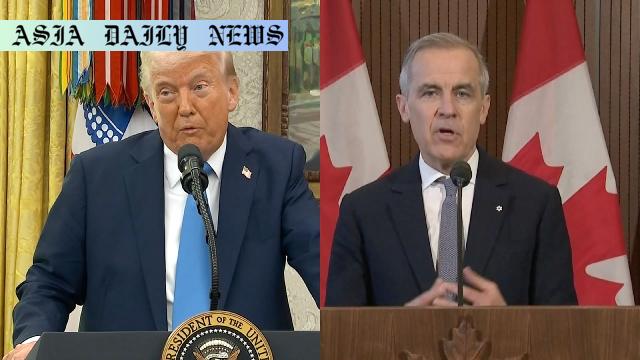Tariffs: The leaders agreed on comprehensive discussions to address immediate trade concerns.

First Call Between Trump and Carney: A Focus on Collaboration
US President Donald Trump and Canadian Prime Minister Mark Carney recently held their first telephone conversation, describing the discussion as productive and substantive. The dialogue was initiated at Washington’s request, underscoring the importance of strengthening relations between the two neighboring nations amid ongoing trade uncertainties. Both Trump and Carney expressed mutual respect and emphasized the need for constructive engagement.
Addressing Key Trade Concerns
One of the central themes of the discussion was trade tariffs and the economic implications for both countries. Talks are set to progress as ministers from each government engage in comprehensive discussions to resolve immediate issues. The leaders aim to bridge differences caused by past tensions and craft policies beneficial for both nations. By doing so, they hope to mitigate risks associated with retaliatory trade measures, such as Canada’s proposed counter-tariffs against U.S. initiatives.
A Step Toward Strengthened Bilateral Relations
This interaction signals a possible shift in tone from President Trump, who previously made controversial statements regarding Canada’s role in North American affairs. Referring to Carney as “Prime Minister” and posting positive remarks about the call on social media, Trump’s apparent change in approach showcases a desire to mend ties. Carney’s proactive stance and commitment to diplomacy also bode well for future engagements.
Upcoming Meetings and Their Significance
With Canada’s general election scheduled for April 28, Trump has expressed a willingness to meet with Carney immediately after the electoral process concludes. This timeline could influence bilateral trade policies and ensure a fresh start under the renewed leadership in Ottawa. Both administrations have emphasized the importance of prioritizing issues like tariffs, fostering economic cooperation, and avoiding unnecessary conflicts.
Implications for Global Trade
The outcome of these discussions holds substantial ramifications not only for North America but for global trade dynamics as well. As two of the world’s largest economies, the U.S. and Canada play pivotal roles in shaping international policy. The leaders’ commitment to dialogue suggests a potential roadmap for easing tensions and fostering a more stable economic landscape. Moreover, it sets a precedent for resolving trade conflicts through diplomacy rather than divisive actions.
Commentary
Evaluating Trump’s Softened Stance Toward Canada
The recent interaction between President Trump and Prime Minister Carney marks a significant moment in U.S.-Canada relations. Historically, Trump’s approach toward Canada has been marked by a mix of criticism and unusual remarks, such as suggesting Canada join the United States as its 51st state. Carney’s emergence on the political stage appears to have elicited a notably different response from Trump, one characterized by respect and cooperation.
The Importance of Addressing Trade Concerns
Trade tariffs serve as one of the most contentious issues between the two nations, often creating economic ripples that extend well beyond their borders. Carney’s warning of retaliatory measures underscores the high stakes involved. It’s encouraging to see both leaders display a willingness to engage in constructive dialogue. Their decision to include ministers from both sides in future discussions is a particularly welcome step, demonstrating a commitment to resolving conflicts at multiple levels.
Paving the Path for Future Bilateral Relations
Looking ahead, the potential meeting planned after Canada’s general election could serve as a pivotal moment for both leaders. By committing to mutual cooperation, they have an opportunity to set the stage for renewed partnerships in trade, economics, and diplomacy. The move toward positivity and substance in their first call provides hope for continued progress.


